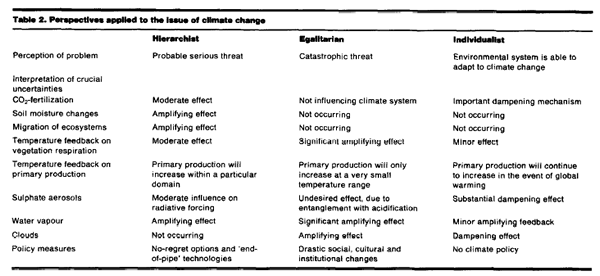The Cultural Theory of risk, often referred to simply as Cultural Theory (with capital letters; not to be confused with culture theory), consists of a conceptual framework and an associated body of empirical studies that seek to explain societal conflict over risk (Wikipedia) World views would be self-reinforcing beliefs and actions.
| characterisitc |
Hierarchist |
Egalitarian |
Individualist |
| myth of nature |
tolerant within limits |
fragile |
robust |
| myth of human |
sinful |
good and malleable |
self-seeking |
| ethical attitude |
partnership |
ecocentrism |
anthropocentrism |
| management style |
control |
prevention |
adaptation |
| salient value |
stability |
equity and equality |
growth |
| attitude towards risk |
risk-accepting |
risk-averse |
risk-seeking |

van Asselt, M. B. A., and Jan Rotmans (1996). "Uncertainty in perspective." Global Environmental Change 6(2): 121-157.
van Asselt, M. B. A., and Jan Rotmans (2002). "Uncertainty in integrated assessment modelleing: from positivism to pluralism." Climate Change 54: 75-105.
![]()